
2074 Results

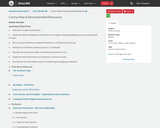
Civil LibertiesThe resources included here are intended to map to the following learning objectives for an American Government Course:Define the concept of civil libertiesExplain the difference between civil liberties and civil rights including identifying issues that overlap both conceptsDiscuss those civil liberties considered essential to a constitutional democracyIdentify the civil liberties protected by the U.S. ConstitutionDescribe the constitutional rights of individuals accused of a crimeExplain the historical evolution of civil liberties in American societyDescribe the role of the federal courts in interpreting and applying civil liberties
- Subject:
- Political Science
- Material Type:
- Module
- Author:
- Timothy Kinsella
- Date Added:
- 06/13/2018

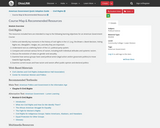
Civil RightsThe resources included here are intended to map to the following learning objectives for an American Government Course:Define and identify key moments in the history of civil rights in the U.S. (e.g. the Brown v. Board decision, Voting Rights Act, Obergefell v. Hodges, etc.) and why they are important.Understand race as a defining factor of the U.S. political party system.Compare and contrast various forms of racism, including both individual attitudes and systemic racism.Discuss the evolution of views on gender and sexuality.Examine how various groups have used political action (legal action and/or grassroots politics) to move towards legal equality.Examine current issues and how racism and sexism affect public opinion and electoral politics
- Subject:
- Political Science
- Material Type:
- Module
- Author:
- Timothy Kinsella
- Date Added:
- 07/02/2018

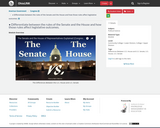
CongressThe resources included here are intended to map to the following learning objectives for an American Government Course:Discuss the theoretical ideas that shaped the structure of Congress.List the constitutional powers of the legislative branch.Differentiate between the rules of the Senate and the House and how those rules affect legislative outcomes.Describe the three major policymaking functions of Congress.Discuss external and internal actors that influence the policymaking processExplain the process of a bill becoming a law.Describe the role of the committee system in the legislative process.Investigate the tension between the goals of individual members of Congress and the goals of Congressional parties and Congress as a whole.
- Subject:
- Political Science
- Material Type:
- Module
- Author:
- Timothy Kinsella
- Date Added:
- 07/11/2018

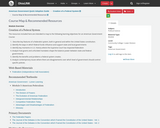
Creation of a Federal SystemThe resources included here are intended to map to the following learning objectives for an American Government Course:Describe key features of a federalist system, both in general and within the United States constitution. Identify the ways in which federal funds influence and support state and local governmentsIdentify key moments in U.S. history where the Supreme Court has impacted federalismAnalyze how grants and unfunded mandates shape the balance power between state and federal governments.Identify the benefits and problems a federal system creates.Analyze contemporary issues where there are disagreements over which level of government should control specific policies.
- Subject:
- Political Science
- Material Type:
- Module
- Author:
- Timothy Kinsella
- Date Added:
- 06/13/2018

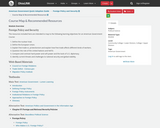
Foreign Policy and SecurityThe resources included here are intended to map to the following learning objectives for an American Government Course:Define the nuclear triad.Define the European Union.Explain free trade vs. protectionism and explain how free trade affects different kinds of workers.Question the role of the United Nations and NATO.Compare and contrast hard power and soft power and the tools of U.S. diplomacy.Identify current threats and challenges to national security and global stability.
- Subject:
- Political Science
- Material Type:
- Module
- Author:
- Timothy Kinsella
- Date Added:
- 07/11/2018

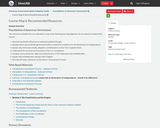
Foundations of American GovernmentThe resources included here are intended to map to the following learning objectives for an American Government Course:Describe key British influences on American political thought. Identify actions by the British government which created the conditions for the Declaration of Independence.Explain why Americans initially adopted a confederation as their form of government.Understand the structure and functions of the U.S. ConstitutionCompare and contrast the views and characteristics of the Federalists and Antifederalists.Explain why Antifederalists wanted a Bill of Rights.Describe the basic mechanics of the Article V Amendment Process.
- Subject:
- Political Science
- Material Type:
- Module
- Author:
- Timothy Kinsella
- Date Added:
- 06/13/2018


Interest GroupsThe resources included here are intended to map to the following learning objectives for an American Government Course:Define what an interest group is, its main purpose and how it functionsCompare and contrast the role of political parties and interest groupsClassify the different types of interest groupsDescribe the tactics employed by interest groups to achieve their political goalsExplain the various theories of power that attempt to explain the advantages and disadvantages of interest groupsAddress the inherent conflict of individuals in a free society pursuing their own interests and the "public good"Explain Federalist No. 10 and how it relates to role of interest groups in a democratic political system
- Subject:
- Political Science
- Material Type:
- Module
- Author:
- Timothy Kinsella
- Date Added:
- 07/11/2018
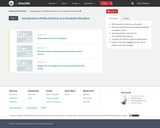
Define political science as a disciplineDescribe qualitative and quantitative methods in political scienceDescribe political science as an interdisciplinary endeavorCompare the different types of government.Explain how civic engagement can lead to political and social change.
- Subject:
- Political Science
- Social Science
- Material Type:
- Unit of Study
- Provider:
- Ohio Open Ed Collaborative

Introduction to Political Science as an Academic DisciplineThe resources included here are intended to map to the following learning objectives for an American Government Course:Define political science as an academic disciplineRecognize the links to many disciplinesIdentify its sub-disciplines of political scienceDefine American National GovernmentDefine politicsDefine power in the context of politicsIdentify models of powerDefine civic engagement
- Subject:
- Political Science
- Material Type:
- Module
- Author:
- Timothy Kinsella
- Date Added:
- 06/13/2018

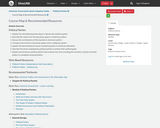
Political PartiesExplain the role political parties play in a democratic political systemDescribe the reasons for the two-party system in American politicsDiscuss the contributions of third parties in American politicsCompare and contrast a two-party system and a multiparty systemExplain the decentralized structure of political parties in American federalismDescribe the tactics employed by political parties to achieve their political goalsExplain how American political parties have evolved over time including the transition of party-centered politics to candidate-centered politics
- Subject:
- Political Science
- Material Type:
- Module
- Author:
- Timothy Kinsella
- Date Added:
- 07/11/2018

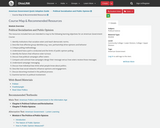
Political Socialization and Public OpinionThe resources included here are intended to map to the following learning objectives for an American Government Course:Identify institutions that socialize voters and teach democratic norms.Describe how affective group identities (e.g. race, partisanship) drive opinions and behaviorCritique polling methodologyUnderstand how a poll is conducted and the limits of public opinion polling.Identify the factors that influence voter turnout.Discuss how political campaigns affect votersCompare and contrast how campaigns design their message versus how voters receive those messagesUnderstand campaign messagingDiscuss how individual bias limits what people know about politics.Describe how social networks influence opinions and engagement.Discuss becoming involved in the political processExamine barriers to political involvement
- Subject:
- Political Science
- Material Type:
- Module
- Author:
- Timothy Kinsella
- Date Added:
- 07/05/2018